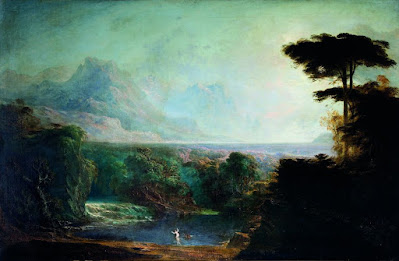There is sweet music in that pine tree's whisper...
- Theocritus, Idyll 1, trans. Anthony Verity
Last week I was in Syracuse, the home of Theocritus and, by extension, pastoral poetry. The first of his Idylls begins with two comparisons of nature and music. The words above are spoken in the poem's opening line by Thyrsis, praising the music of a goatherd's pan pipes. The goatherd replies 'shepherd, your song sounds sweeter than the water tumbling / over there from the high rock.' Thyrsis is persuaded to sing The Sufferings of Daphnis, the lament of a dying Sicilian cowherd (the reasons for his death are left mysterious). I have described here before Virgil's references to Daphnis in his Eclogues, and also the ancient novel Daphnis and Chloe, although in that story Daphnis tends goats on Lesbos. Re-reading Theocritus after visiting Sicily reminded me that many of his poems are set in the wider Greek world, although Idyll 16, is addressed to the tyrant of Syracuse, Hieron II. Both Idyll 16 and Idyll 1 refer to Arethusa, a spring that you can still visit on the island of Ortygia (the old centre of Syracuse). It is just be the sea and walled in to create a pond inhabited by fish and ducks.
In Greek mythology, Arethusa was a nymph who fled from her home in Arcadia, emerging eventually as a fresh water fountain on Ortygia. The predatory male in this story was Alpheus, a river god, who pursued her until she prayed to be transformed into a cloud. But Alpheus wouldn't let up and, perspiring with fear, she turned into a stream and flowed through the sea until she reached safety in Syracuse. Ovid called her Alpheius - the name of a Greek river (it is said that a wooden cup thrown into the Alfeiós will eventually turn up in the Spring of Arethusa). Virgil alludes to this story when Aeneas reaches Sicily: 'an island lies over against wave-washed Plemyrium, / stretched across a Sicilian bay: named Ortygia by men of old. / The story goes that Alpheus, a river of Elis, forced /a hidden path here under the sea, and merges / with the Sicilian waters of your fountain Arethusa.' Virgil addresses his tenth Eclogue to Arethusa and refers to the story of Daphnis told by Theocritus, relocating the setting from Sicily to (an imaginary) Arcadia.
Unsurprisingly Arethusa gets frequently mentioned in later pastoral poetry, right up to Wordsworth, who wonders in The Prelude whether 'that fountain be in truth no more'. Milton had referred to it in his elegy Lycidas, along with Mincius, a river in Italy that features in Virgil's Eclogue 7. 'O fountain Arethuse, and thou honour'd flood, / Smooth-sliding Mincius, crown'd with vocal reeds, / That strain I heard was of a higher mood.' But Samuel Johnson was not impressed with poetry of this kind. 'It is not to be considered as the effusion of real passion; for passion runs not after remote allusions and obscure opinions. Passion plucks no berries from the myrtle and ivy, nor calls upon Arethuse and Mincius, nor tells of rough satyrs and fauns with cloven heel. Where there is leisure for fiction there is little grief.'



No comments:
Post a Comment